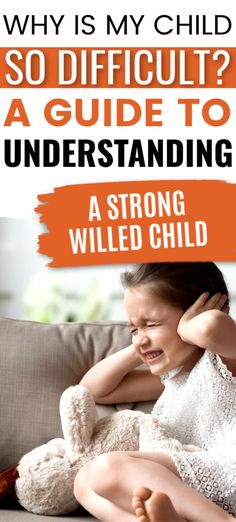[ad_1]
Sneak peek: A brand new take a look at the analysis on easy methods to self-discipline a strong-willed youngster. Perceive your strong-willed youngster in a brand new gentle!
Sturdy-willed kids have a little bit of a nasty status in our tradition. Only a fast take a look at Pinterest reveals this straight away. Search up “parenting strong-willed kids” and also you’ll get all kinds of articles for methods to “repair them” or “easy methods to self-discipline a strong-willed youngster.” Different outcomes present issues like, “why strong-willed kids don’t obey” or related matters.
I perceive this urge. I’ve two very strong-willed sons and we have now had our justifiable share of tense interactions. those the place your youngster is extra probably to decide on to go to mattress early than to do one thing you requested, like clear up the toys within the playroom. Or the time they repeatedly ask for one thing you’ve already mentioned no to, simply on the odd likelihood that possibly this time you’ll say sure.


They’re persistent. They don’t surrender. They insist on doing issues their very own means, even when you inform them repeatedly, that their means most likely received’t work.
What Does “Sturdy-Willed” Actually Imply?
This notion of strong-willed kids as one thing to be “mounted” or “overcome” goes again a long time. In a few of the earliest analysis on temperament, kids that at present we would name “strong-willed” have been typically labeled as “troublesome.” The kid with a “troublesome” temperament was the one who wanted extra consideration, extra steerage, and extra help. Mainly, it was the kid who put extra pressure on their mother and father’ skills.
Extra just lately, most individuals who studied temperament have used different descriptors moreover the phrase “troublesome,” nevertheless it factors to an fascinating understanding of those kids’s personalities. As Stuart Shanker properly factors out, the time period “troublesome” comes from the perspective of the mother or father. For whom is that this youngster troublesome? The label has to do with the quantity of stress that this temperament places on mother and father. This label doesn’t symbolize the world from the kid’s perspective.
Associated studying: “Tough” Temperament ≠ A Youngster Destined for Issues: Delicate Parenting is Key
From the kid’s perspective, they aren’t troublesome. That is simply who they’re. These are a few of the innate traits that they carry inside them. This isn’t to say {that a} strong-willed temperament (or any temperament) is deterministic. People are advanced and we modify and develop all through our lives.

Seeing Sturdy-Willed Youngsters from a New Perspective
Let’s flip the script just a little bit on this notion of strong-willed kids and their personalities.
I used to be serious about this the opposite day after I got here throughout a quote that I believe suits this example. I used to be listening to the podcast Happier with Gretchen Rubin, and she or he talked about this quote,
“It’s not a bug; it’s a characteristic.”
This quote apparently goes again a number of a long time from when software program programmers first began designing packages. Software program engineers oftentimes design a program solely later to search out that there’s some kind of anomaly that they didn’t count on within the software program. Over time, they got here to make use of this quote, “It’s not a bug; it’s a characteristic” to level out that not all sudden qualities of a software program program are essentially dangerous issues. It’s all about your perspective. One thing which may trigger an issue for one person, that they could see as a glitch or bug may truly be one thing one other person truly finds useful.

Now, when Gretchen Rubin mentioned this quote she talked about it within the context of her personal persona or maybe the persona of buddies. Everybody has little quirks of their personalities and a part of self-acceptance has to do with coming to just accept these elements of your persona. Once I heard this quote, I instantly thought of parenting. What if we considered our children this fashion? What if their distinctive options, their temperaments weren’t bugs, however options? What if it’s not a glitch, however a key piece of who they’re?
So this quote, “It’s not a bug; it’s a characteristic” has grow to be my new motto when parenting strong-willed kids (actually all kids for that matter). This angle has led me to a complete sequence of myths that I believe are current in our tradition about strong-willed kids. These come from this angle that strong-willed kids have one thing in them that must be “mounted” or modified or someway moderated.
So, these are myths which are widespread in our tradition but when we take a look at the analysis, we start to see why these myths aren’t true. Let’s delve into these myths.
Disciplining a Sturdy-Willed Youngster: Some Myths
Fantasy #1: Harsh punishment works.
This can be a widespread response to strong-willed kids. After they received’t comply, crank up the punishment. You probably have a strong-willed youngster, this not often works. When harsh punishment is introduced into the image, strong-willed kids often both grow to be entrenched or insurgent. The battle is on and they’re ready not to lose. It’s because they often have a robust sense of justice, need mastery over issues, and are experiential learners. All this mixed with harsh punishment often ends in a battle scenario fairly than compliance.
Moreover, within the thoughts of a strong-willed youngster, harsh punishment endangers the parent-child relationship. Considerably surprisingly, analysis reveals us that strong-willed kids do truly worth relationships extremely and reply effectively to relationships, not pressure. Sturdy-willed kids reply higher when the connection is prioritized.

What to do as a substitute
As an alternative of harsh punishment, there are a number of different concepts to strive for easy methods to self-discipline the strong-willed youngster:
- Allow them to face the results of their selections (if not harmful). Combating over a easy determination will get mother and father nowhere with a strong-willed youngster. As an alternative, enable them to expertise the pure penalties of their selections (if potential and protected). For instance, in case you are attempting to get out the door and your youngster refuses to put on socks, strive permitting them to not put on socks. If their ft get chilly, they are going to expertise the consequence of that. This isn’t fail-proof nevertheless it does enable for some classes to be discovered and fewer battle.
- Supply selections the place potential. Providing selections is a basic parenting transfer that many people have tried. Sturdy-willed kids prefer to have mastery over issues so this may assist. Present selections for them to select from when potential– ”Do you need to put on the yellow gown or the purple one?” “Do you need to go to the park or the grocery retailer first?”
- Permit them mastery over what they will do safely. Sturdy-willed kids are likely to study by doing issues. In case your youngster at all times desires to do duties by themselves, see which duties appear age-appropriate for them to finish. My strong-willed son at all times wished to chop his personal fruit when he was about 4 years outdated. He was too younger to wield an grownup knife however I discovered a kid-safe knife with which he may lower a number of items. Win-win!
-
-
- Permit for all emotions, however the boundaries stick. This can be a key technique in constructive parenting that’s useful for all youngsters however works particularly effectively for strong-willed kids. Sturdy-willed youngsters are likely to have a whole lot of massive emotions. They should specific them (it’s an actual want) however we have to foster wholesome methods for them to precise them. Hitting, kicking, screaming, and so forth. aren’t often the methods we wish them to precise these massive emotions. With constructive parenting, we attempt to enable all emotions however mannequin and encourage constructive methods of expressing feelings.
-
You may say one thing like, “I perceive that you’re mad at your sister, however hitting is not okay in our home. Why don’t you go outdoors and run to burn off that offended power?”
By conditions like this, youngsters study that we empathize with their emotions however there are boundaries round which habits is protected or acceptable.
Fantasy #2: They don’t care what you suppose
Opposite to outdoors appearances, strong-willed kids do typically care what you consider them. They’ve such a robust sense of justice that they don’t prefer to “lose face” in confrontations, even with their mother and father.
As I discussed in #1, strong-willed kids do worth relationships very extremely, particularly with mother and father, nevertheless it doesn’t at all times come throughout of their habits.
What to do as a substitute
- Don’t feed the facility battle. This concept is, in fact, simpler mentioned than carried out. The place potential, strive to not interact in an influence battle with strong-willed kids. Should you really feel an influence battle approaching, take a step again and keep in mind the connection. It may be useful to remind them how a lot you like them and the way you don’t need this to be a battle.
- The foundations nonetheless stand. Attempt to implement and implement constant guidelines. Make the boundaries concerning the guidelines, not you or them. Be clear that the foundations are set as much as hold everybody protected and wholesome and everybody in the home follows them.
Extra myths to return! Keep tuned for the subsequent article with a number of extra widespread myths about easy methods to self-discipline a strong-willed youngster.
Within the meantime, keep in mind: “It’s not a bug, it’s a characteristic.”
[ad_2]
Supply hyperlink
